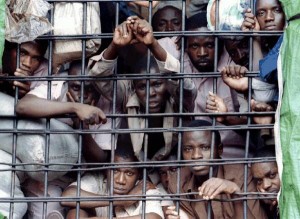
( By Abdulkadir Ahmed Ibrahim, FNGE) Whatever meaning is given to the idiomatic or philosophical expression “life begins at 40’, it is a consensus that a journey or a period of forty years is considered long enough to near a destination or attain maturity. Many people consider turning 40 years as a milestone that heralds the beginning of middle age in one’s life. French poet, novelist, playwright and human rights activist, Victor-Marie Hugo (1802 to 1885) was of the opinion that “40 years is the old age of youth”.
This reminds me of one of the matters of the moment in Nigeria as the Legal Aid Council of Nigeria celebrates 40 years of existence this week with activities that include Paralegal Train the Trainers Workshop, Commissioning of the Council’s new Head Office, Launching of a National Legal Aid Strategy and Presentation of Awards to Individuals and Organisations who contributed to the birth and growth of the Council.
But the story of the Council will not be complete without mentioning the efforts of some private Lawyers, notably, Chief Timothy Chimizie Ikeazor, SAN, Chief Adebowale Durosaiye Akande, SAN, and Chief Dr Solomon Daushep Lar, SAN., CON., who formed the Association of Public Defenders (later the Legal Aid Association of Nigeria) in the early 1970s. Their objective was to provide pro bono legal services to indigent, economically deficient and less privileged Nigerians.
The struggle of the “Comrades” continued until the association was recognized and given formal and legal status by the Federal Military Government with the promulgation of Decree No. 56 of 1976 on 10th November, 1976, which established the Legal Aid Council to render legal aid and access to justice to indigent persons as widely as possible within its financial resources.
Over the years, the decree had been amended and later codified (except the 1994 amendment) into what is now known as Legal Aid Act. Cap 205, Laws of the Federation 1990. The Legal Aid (Amendment) Decree No. 22 of 1994 was symbolic in that it expanded the jurisdiction of the scheme to include damages for breach of Fundamental Human Rights as guaranteed by the Constitution. The Decree was amended by the Legal Aid Act Cap L9, Law of the Federation, 2004 and to conform to the current democratic dispensation, the law was repealed in 2011 by the Legal Aid Act 2011.
This new law is also meant to comply with international standards of providing legal aid and access to justice fund into which financial assistance would be made available to the council on behalf of indigent citizens to prosecute their claims in accordance with the constitution.
The act also empowers the Legal Aid Council to be responsible for the operation of a scheme for the grant of legal aid and access to justice in certain matters or proceedings to persons with inadequate resources in accordance with the provision of the act.
The Council with headquarters in Abuja, conducts its operations through offices in 36 states, 6 zonal offices, Legal Aid Centres (14 for now) in Local Government Area Councils in some States and the Federal Capital Territory as part of the drive to establish legal aid offices in all the 774 Local Government Areas of the Federation.
The vision of the founding fathers of the Legal Aid Council was to see “a new Nigerian nation where there is equal access to justice for all irrespective of means and where all Constitutional rights are respected, protected and defended to ensure justice for all.”
Its motto is “Giving Voice to the Voiceless” while the Mission Statement is “To remain the leading and pro-active provider of free, qualitative and timely legal aid services in Nigeria, ensuring social justice and the emancipation of the oppressed, reprieve to the weak and vulnerable thereby giving voice to the voiceless.”
The Objectives and Mandates of the Council are excellent but the extent to which they are achieved and carried out in the 40 years of its existence leaves much to be desired.
It is only now that the Council is having its own building as headquarters while a visit to some of its State Offices will show that it needs one aid or the other. The staff are either being moved randomly from one building to another by their host state governments or are provided with office accommodation at remote areas while in some cases, tables, chairs and other office furniture at these state offices are better imagined than seen.
Ordinary stationeries are sometimes provided by indigent litigants. Official Vehicle of the Council is a novelty in some of the State Offices and where available, it is as good as none because of its condition as maintenance and regular servicing are not routine due to lack of funds. The monthly financial grant to cover recurring costs of maintenance and utilities among others from the headquarters was no longer regular even before current economic recession.
The immediate past Chairman of the Governing Board of the Council, Chief Bolaji Ayorinde, SAN, confessed that the Council was “grappling with challenges of poor funding and logistics.”
He told the Lagos based Newswatch Times Newspaper that “logistical challenges are in fact dogging even the best efforts of the council’s staff members.”
“Although some people have expressed disappointments, you must also appreciate that logistical challenges are there to be grappled with by the lawyers. For example, you have to transport these lawyers to the prisons, to the courts, back to their offices, and that is huge,” he argued.
The much talked-about congestion at Nigerian Prisons remains a nightmare and majority of the inmates are indigent Nigerians awaiting trial who cannot afford to pay for legal services to be represented in courts while others are minor offenders who couldn’t pay the option of fine given by the courts that tried them. This is where the services of the Legal Aid Council are needed most. But alas, lack of funds and inadequate manpower.
I can recall that the Senate at a plenary on Wednesday 4th July, 2012, advised the Executive to hand over the Prison Decongestion Programme to the Legal Aid Council. This followed the adoption of the report of the Senate Joint Committee on Judiciary, Human Rights and Legal Matters, Interior and Police Affairs on the plight of persons awaiting trial in Nigerian prisons. The now five-year old motion by the distinguished Senators remain an advise as nothing was done in that regard by the executive despite the billions of naira appropriated every year for the programme.
With all these problems and no solution at sight, yet the Legal Aid Council is celebrating 40 years of existence. Yes, but being “indigent” itself the council is partnering an NGO – Prisoners Rehabilitation and Welfare Action, PRAWA, to organize the events under the “Support to the Justice Sector in Nigeria” project funded by the European Union and implemented by the United Nations Office on Drugs and Crime, UNODC.
However, despite the constant decline in financial appropriation (both recurrent and capital) for the council, the present management under the Director General, Mrs Joy Bob-Manuel, remained focused on its mandate of representation of indigent citizens and is witnessing a steady increase in the number of cases handled annually. Averagely, Legal Aid Council handles not less than 25,000 criminal and civil cases annually for poor citizens across the country.
Legal Aid Council has also bought a building at a strategic location in Abuja to serve as a befitting headquarters while private legal practitioners are enrolled in the Private Legal Practitioners Directory as mandated by the enabling law. The purpose was to expand, coordinate and supervise legal aid delivery with the assistance of members of the Nigerian Bar Association to provide pro bono legal services.
While we say happy birthday, we need to remember that the services of Legal Aid Council are geared towards reducing, to the barest minimum, incidents of Human Rights abuses perpetrated against the citizenry by either the law enforcement agents or the affluent in the society. By extension, the Council is in the vanguard for social Justice and emancipation of the oppressed, the weak and the vulnerable groups, thus, “Giving Voice to the Voiceless”. All and Sundry should partner with the Council to achieve the desired objectives.
Abdulkadir Ahmed Ibrahim, FNGE., a former member of the Governing Board of Legal Aid Council, wrote from Kano. Email: teeceexpee@yahoo.com
 ..:: AUTO REPORT AFRICA ::..
..:: AUTO REPORT AFRICA ::..




